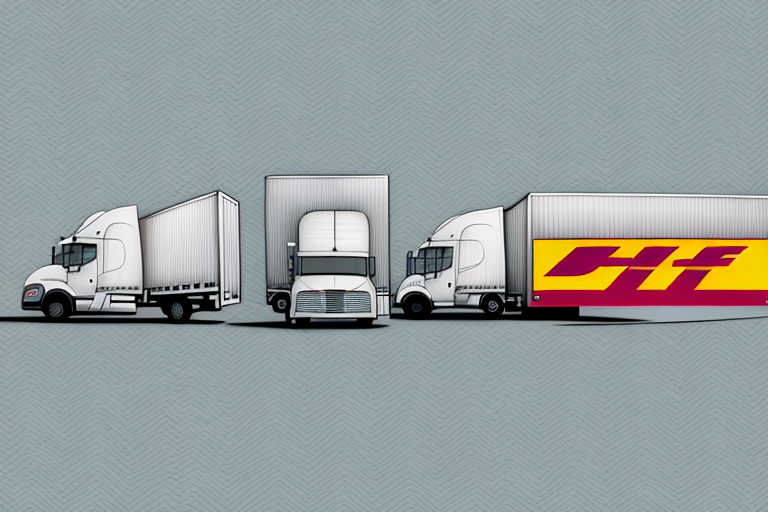Overview of DHL, UPS, and FedEx Shipping Services
Shipping is a crucial element of any business that deals with physical products, but choosing the right company can be challenging. DHL, UPS, and FedEx are three of the most well-known shipping companies globally, each offering a variety of services and advantages. This comprehensive guide explores the differences between these industry giants to help you determine the best fit for your shipping needs.
Key Differences Between DHL, UPS, and FedEx
Global Reach and Coverage
DHL boasts an extensive global network, particularly strong in Europe and Asia, operating in over 220 countries and territories.
UPS maintains a robust presence in North America and is expanding its global footprint, serving more than 220 countries and territories.
FedEx is renowned for its global express services, with operations in over 220 countries and territories, emphasizing same-day and overnight delivery options.
Service Reliability and Reputation
In terms of service reliability, UPS and FedEx often receive higher ratings compared to DHL. According to recent industry reports, UPS and FedEx consistently score higher in on-time delivery and package handling.
However, DHL excels in integrated supply chain solutions, particularly for international logistics, making it a preferred choice for businesses with global operations.
Shipping Rates and Pricing Structures
Domestic Shipping Costs
FedEx and UPS typically offer more cost-effective options for domestic shipping within regions like North America. For example, UPS Ground is often cheaper for standard deliveries compared to FedEx Express.
International Shipping Costs
DHL can be more expensive for international shipments but justifies it with its extensive global delivery network. DHL Express provides competitive rates for cross-border shipping, supported by their strong presence in key international markets.
Pricing Flexibility and Options
All three companies offer a range of services, such as express, economy, and same-day options, allowing businesses to choose based on budget and delivery speed requirements.
Delivery Times and Reliability
Express and Overnight Services
FedEx is renowned for its rapid delivery times, especially with services like FedEx SameDay® and FedEx Overnight®.
UPS offers UPS Next Day Air and UPS Express Critical services, ensuring quick delivery with high reliability.
DHL provides express delivery internationally, though delivery times may vary depending on the destination due to its international focus.
On-Time Delivery Guarantees
FedEx and UPS offer money-back guarantees for late deliveries, enhancing their reliability. DHL similarly provides delivery guarantees for international shipments, ensuring commitment to timely deliveries.
Coverage Areas and Global Reach
Domestic and International Coverage
FedEx and UPS have comprehensive coverage both domestically and internationally, making them versatile options for various shipping needs.
DHL excels in overseas delivery, particularly in regions where other major carriers may have limited presence.
Specialized Logistics Solutions
Each company offers specialized solutions tailored to specific industries:
- UPS: Known for handling hazardous materials with stringent safety protocols.
- FedEx: Offers specialized healthcare divisions for temperature-controlled shipping, ensuring the integrity of sensitive medical supplies.
- DHL: Provides customized logistics solutions for the automotive industry, facilitating seamless supply chain operations.
Types of Shipping Services Offered
Ground, Air, and International Shipping
All three companies provide:
- Ground Shipping: Cost-effective but slower, suitable for non-urgent shipments.
- Air Shipping: Faster delivery times but higher costs, ideal for urgent or high-value items.
- International Shipping: Varies by company strengths, with DHL leading in global express services.
Additional Services
Consider services like package tracking, insurance, and signature confirmation to secure your shipments.
Technology, Innovation, and Sustainability
Advanced Tracking and Notification Systems
All three companies offer sophisticated tracking systems:
- UPS and FedEx provide real-time tracking options via their respective platforms.
- DHL’s tracking system is comprehensive and user-friendly, offering detailed shipment tracking and updates.
These systems include notifications via email, text, or phone, keeping customers informed about their shipment’s status in real-time.
Innovation in Delivery Technology
Key technological advancements include:
- FedEx: Invests in eco-friendly practices and state-of-the-art technology to enhance delivery efficiency.
- UPS: Emphasizes electric delivery vehicles and drone delivery options to reduce carbon footprint and increase delivery speed.
- DHL: Focuses on integrating supply chain solutions with innovative technologies to streamline logistics processes.
Sustainability Efforts
All three companies have reinforced their commitment to sustainability:
- Investment in eco-friendly vehicles.
- Implementation of carbon-neutral delivery options.
DHL aims to achieve zero logistics-related emissions by 2050, leading the way in sustainability efforts within the shipping industry. Learn more about their initiatives here.
Choosing the Right Shipping Partner for Your Business
Factors to Consider
Selecting the appropriate shipping company depends on several factors:
- Shipping rates
- Available services
- Delivery times
- Coverage areas
- Additional features such as tracking and insurance
Assessing Your Specific Needs
Evaluate your business or personal needs, including shipping volume, destination, preferred delivery speeds, and any specialized requirements to decide which shipping provider aligns best with your objectives.
Tips for Maximizing Your Shipping Experience
- Accurately measure and weigh packages to avoid unexpected costs.
- Utilize tracking and notification systems to monitor shipments effectively.
- Consider additional services such as insurance and professional packaging to secure your shipments.
Future Trends in the Shipping Industry
- Expansion of same-day and next-day delivery options to meet increasing consumer demand for speed.
- Incorporation of drone technology and autonomous vehicles for remote and efficient deliveries.
- Enhanced focus on eco-friendly practices, including the use of electric and hybrid delivery vehicles to reduce environmental impact.
Pros and Cons of Using Third-Party Shipping Services
When deciding between using a third-party shipping service and directly using DHL, UPS, or FedEx, consider the following:
- Third-Party Services: Offer convenience, support, and potentially lower rates through bulk shipping agreements, but may add additional costs and complexities.
- Direct Use: Allows for greater control over shipments and potentially more reliable service, but may require more time and effort in managing shipments independently.
Evaluate these pros and cons based on your specific needs to make an informed decision.
Conclusion
In conclusion, DHL, UPS, and FedEx are all excellent shipping options, each with unique advantages. Understanding the differences in shipping rates, delivery times, coverage areas, and additional services can help you make the best choice for your business or personal needs. By considering these factors and maximizing your shipping experience, you can ensure a smooth and efficient shipping process.






















